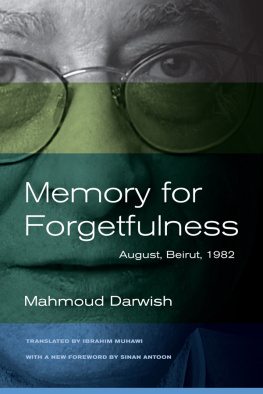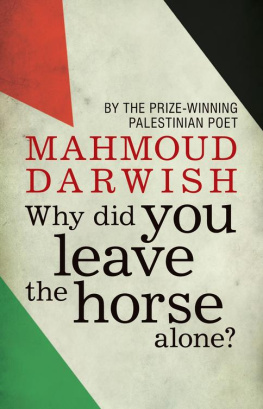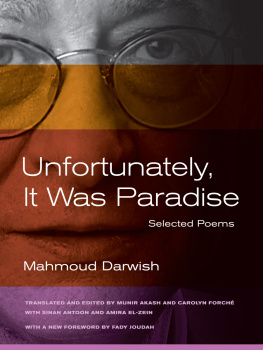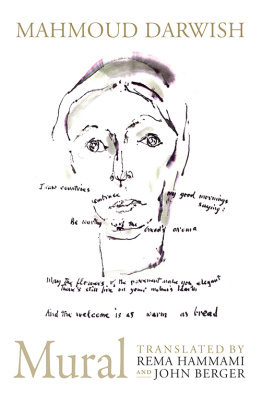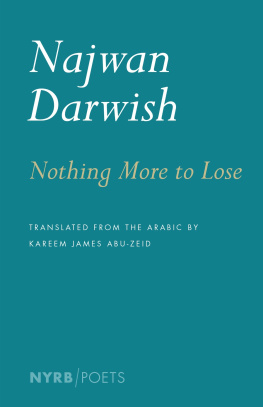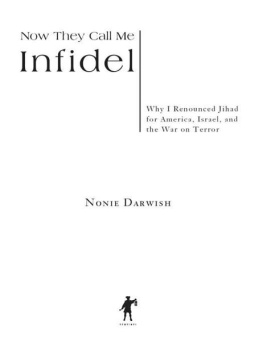
Copyright Mahmoud Darwish/Actes Sud
English translation copyright Ibrahim Muhawi, 2010
First Archipelago Books Edition, 2010
First published as Yawmiyyt al-Huzn al-d by Dr al-Awda in Beirut in 1973.
All rights reserved. No part of this book may be reproduced or retransmitted in any form without prior written permission of the publisher.
Library of Congress Cataloging-in-Publication Data
Darwish, Mahmud.
[Yawmiyat al-huzn al-adi. English]
Journal of an ordinary grief / by Mahmoud Darwish ; translated [from the Arabic]
by Ibrahim Muhawi. 1st ed.
p.cm.
First published as Yawmiyat al-huzn al-adi in 1973.
ISBN 978-1-9357446-9-6
1. Jewish-Arab relations. 2. Darwish, Mahmud.
I. Muhawi, Ibrahim, 1937 II. Title.
DS119.7.D2913 2010
305.89274dc222010027211
Archipelago Books
232 Third St. #A111
Brooklyn, NY 11215
www.archipelagobooks.org
Distributed by Consortium Book Sales and Distribution
www.cbsd.com
Cover art: Henri Michaux, La Cordillra des Los Ands
Jacket design by David Bullen
This publication was made possible by the generous support of Lannan Foundation, The National Endowment for the Arts, and the New York State Council on the Arts, a state agency.


| Manufactured at Thomson-Shore, Inc., in Dexter, Michigan
Visit Thomson-Shore on the web at www.thomsonshore.com |
This translation is dedicated
to the people of Gaza
Acknowledgments
I am grateful to Lannan Foundation for the grant of a residency that helped get this project on its way. In particular I wish to thank Patrick Lannan, president; Martha Jessup, program director (Residency Program); Douglas Humble, residency manager in Marfa (Texas); and Ray Freese, assistant residency manager. I would also like to take this opportunity to express my appreciation of the Foundations commitment to cultural freedom. A number of individuals have also contributed to the welfare of this book: Afaf Ackall kindly volunteered her own copy of the 2007 edition of the work. Muhammad Siddiq was generous with advice on meaning and language on the numerous occasions when I asked for it. Jill Schoolman, founder of Archipelago Books, has been supportive throughout. With her careful editing she has done readers of this translation a favor. Thanks also to Dan Avnon and Leonard Schwartz, who provided helpful information on Martin Buber. It also gives me great pleasure to acknowledge the contribution of Jane Muhawi, my partner in this work, whose enthusiasm I treasure and whose literacy, mastery of the sound patterns of English, and editorial skill always leave her stamp on my work.
Foreword
Journal of an Ordinary Grief (Yawmiyyt al-Huzn al-d, 1973) is the first of three major prose works that form a trilogy spanning Darwishs career. (We always have to be careful in selecting descriptive terms for Darwish. True, these are prose works, but they are far from being prosaic.) The second, Dhkira lil-Nisyn a memoir of the 1982 Israeli invasion of Lebanon appeared in 1985, and my translation (Memory for Forgetfulness, University of California Press) in 1995. The third volume, F Hadrat al-Ghiyb (In the Presence of Absence), appeared in 2006, two years before the poets death. To the extent that they are based on the poets actual experience, these works may be considered autobiographical, though Journal tends more in that direction than the other two.
In this book we read about the poets experience of house arrest, his encounters with Israeli interrogators, and the periods he spent in prison. Readers should not expect straightforward autobiographical narrative, however, but a work in the symbolist mode, in which the semantic range of words is extended. From the beginning of his career, Darwish had already adopted Palestine as his cause clbre, but it is in this work that he makes an explicit declaration of his mission: Your cause and your life are one. And before all this and beyond it it is your identity. This identification is part of the symbolist equation of himself and Palestine. It is as much a poetic identification as it is political; in other words, it is an equation of the poetic with the political. To avoid confusion, readers should keep this identification in mind. Expressions like your death, the first death, or the nineteenth anniversary of your killing, do not refer to his personal death but to the loss of Palestine in 1948. The pronoun I, for example, can refer to the poet as an individual but can also stand for the Palestinian people as a whole. The author uses a number of forms here, principally dialogues with imaginary partners. The opening part of the book is a dialogue that places the reader in a strange space because we cannot tell who is talking to whom until the end of the section, when we discover that the dialogue has been between the author and himself as a child. In Journal, as in all of Darwish, we are placed in the middle of an encounter between writing and history where writing gives shape to the homeland.
This work first appeared in Beirut (Dr al-Awda), two years after the poet left his homeland to become an exile. In taking a close look at the existentially complex situation of the Palestinians in Israel proper, and in exploring the meaning of resistance and the ambiguity of his identity as an Israeli Palestinian an ambiguity that becomes a major theme and poetic figure in all his work this prophetic book provides the background for the poets decision to become an exile. Irony is probably the literary mode most appropriate to exile. Loss of homeland and life under occupation the major themes of this work are not ordinary griefs. Darwishs irony, which undoubtedly stems from the complexity of being an Israeli Palestinian, is a distinguishing feature of all his work.
In preparing this translation I faced a difficult decision. The opening parts of the work as it originally appeared in 1973 were omitted in later editions (Riad El-Rayyes Books). The scholar in me decided that the 1973 edition must be translated in full because it forms part of the record of Darwishs corpus aside of course from the significance of its content. After careful consideration I decided to include the omitted material as an appendix, except for Darwishs own introduction to the original edition (These Pages), which I put at the beginning for the thought it articulates about writing and the homeland. Particular attention, however, should be paid to the opening section of the appendix, which explains the dilemma Darwish faced in living in Israel but without citizenship: The ground of perplexity lay between the truth of your being and your current legal status.
I was guided in the process of translation by two precepts from Darwish himself: rhythm and the sentence as a unit of meaning. The first section of his 2005 volume of poems, Dont Apologize for What Youve Done, consisting of 47 poems, is called The Passion for Rhythm (literally, lusting after rhythm), and the first poem of that section is called The Rhythm Chooses Me. (The rhythm chooses me / It chokes on me.) This is the most explicit and powerful articulation of Darwishs concern with rhythm, which always was a major esthetic preoccupation for him.
Toward the end of Journal, Darwish refers the reader to the Arabic sentence (Going to the Arabic Sentence on May 15). This phrase is an excellent illustration of the symbolist mode mentioned earlier: in combing together words or phrases that apparently do not belong side by side, the poet extends the metaphorical potential of the individual words as well as the meaning. The verb go itself rich in connotation makes of language a place, thereby extending the sense of the word
Next page

